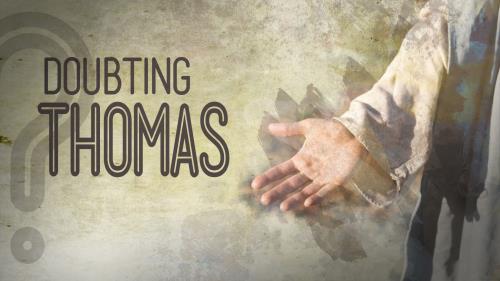-
From Doubt To Faith. The Journey Of Belief. John 20:24-31
Contributed by David Cramer on Nov 23, 2024 (message contributor)
Summary: A message for a new way of looking at things. Overcoming doubt and growing in faith.
- 1
- 2
- Next
From Doubt to Faith. The Journey of belief. John 20:24-31
Good Morning
Stand with me and lift your bible and repeat after me. m D
This is my Bible.
I am what it says I am.
I can do what it says I can do.
I am going to learn how to be what it says I can be.
Today I will learn more of the word of God.
The indestructible, never ending, living word Of God.
I will never be the same.
I will never be the same.
In Jesus Name
Amen?
Before you sit down, say, “Hello” to someone you may not know.
From Doubt to Faith: The Journey of Belief
Turn with me to John 20:24-31 and say, “Amen” when you are there.
"A young woman once shared how she struggled with faith after losing her job. Her prayers seemed to be unanswered, and doubt began to creep in. One night, she broke down and told God, ‘If You’re real, show me.’ Days later, an unexpected opportunity arose that not only provided for her needs but deepened her faith in ways she never imagined."
"Like her, we all have moments of doubt. But what if our doubts are an invitation to encounter Jesus more deeply?
Today, we’ll look at Thomas’s journey—a disciple often remembered as 'Doubting Thomas'—but whose story reveals the beauty of moving from doubt to unshakable faith."
I. Thomas: The Honest Doubter (Verses 24-25)
Why Thomas?
Thomas wasn’t with the disciples when Jesus first appeared. When told of the resurrection, he responded, "Unless I see the nail marks in His hands and put my finger where the nails were, I will not believe."
Thomas’s doubt wasn’t rebellion; it was born from pain and disappointment. He had followed Jesus wholeheartedly and saw Him die. How could he dare to hope again?
You and I know of someone wrestling with doubt—perhaps someone who faced unanswered prayers or personal loss—and how their journey led to a deeper faith.
A person battling depression doubted God's presence but, through the encouragement of others and small steps of faith, began to see God’s hand in their healing journey.
- We have to acknowledge that doubt is natural, especially in times of struggle.
- We have to get in the habit of bringing our doubts to God.
He welcomes honesty because He desires a real relationship, not blind faith.
II. Jesus Meets Us in Our Doubts (Verses 26-27)
Eight days later, Jesus appeared again, this time with Thomas present. Without being asked, Jesus addressed Thomas’s exact request: "Put your finger here; see my hands."
- Jesus didn’t reprimand Thomas. Instead, He lovingly met him where he was.
An example of doubt may be:
A missionary doubting their calling until God confirmed it through a specific scripture, a stranger’s encouragement, or a miraculous provision.
- Jesus understands our struggles and meets us where we are.
- We need to look for ways Jesus may already be revealing Himself through His Word, His people, and their circumstances.
III. From Doubt to Worship: Thomas’s Declaration of Faith (Verse 28)
- Thomas’s Response:
"My Lord and my God!"
This is a powerful confession of Jesus’s divinity. Thomas’s doubt wasn’t the end of his faith; it became the doorway to a deeper revelation of who Jesus is.
- Job, who questioned God but ultimately proclaimed, "My eyes have seen You" (Job 42:5).
Those of us who attend church on a regular basis may have seen someone who struggled with faith but, through a miraculous encounter—such as healing, deliverance, or an unexplainable peace—moved from questioning to worshiping.
- We need to evaluate our faith. Have we truly declared Jesus as “My Lord and my God,” or are we holding back?
V. Blessed Are Those Who Believe Without Seeing (Verse 29)
- Listen to Jesus’s Blessing:
"Blessed are those who have not seen and yet have believed."
This blessing extends to all who believe through the testimony of others.
- Faith requires trust in God’s character, even when the evidence isn’t immediately clear. Remind listeners that the greatest blessings often come when we walk by faith, not by sight.
V. The Purpose of the Gospel (Verses 30-31)
- John’s Intent:
"These are written so that you may believe that Jesus is the Messiah, the Son of God, and that by believing you may have life in His name."
- The Gospel isn’t just about information; it’s about transformation. Belief in Jesus leads to eternal life and abundant life now.
"Today, you’ve heard about Thomas’s journey from doubt to faith.
Now it’s time to reflect on your own.
Are you carrying doubts or disappointments?
Are you ready to declare, like Thomas, ‘My Lord and my God’?
Jesus is here, inviting you to stop doubting and believe."
1. For those who have never accepted Jesus:

 Sermon Central
Sermon Central



